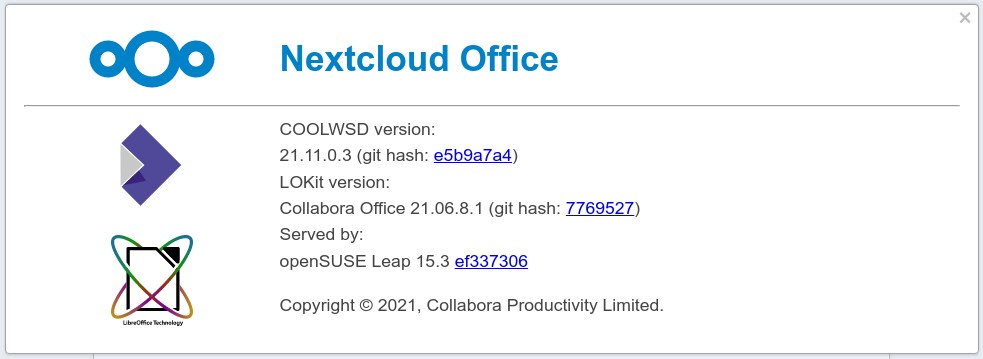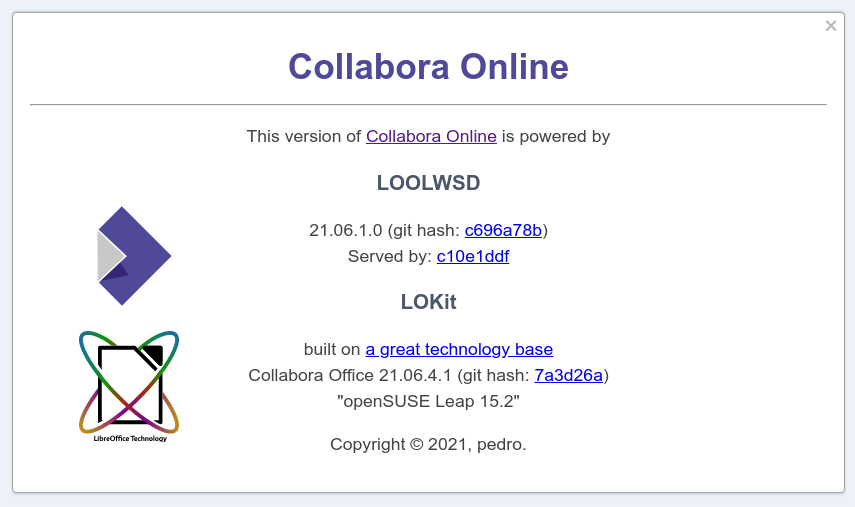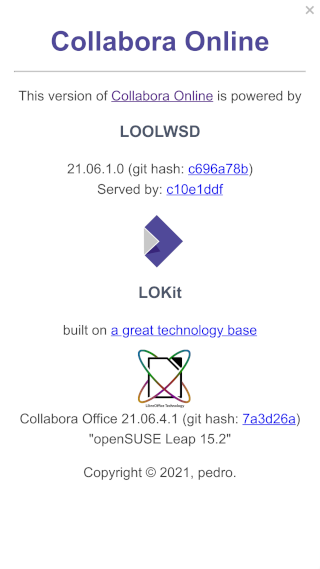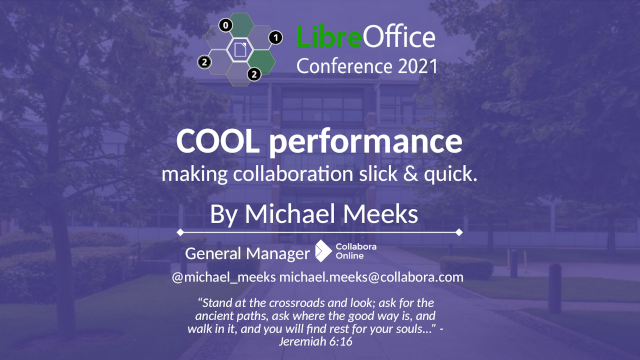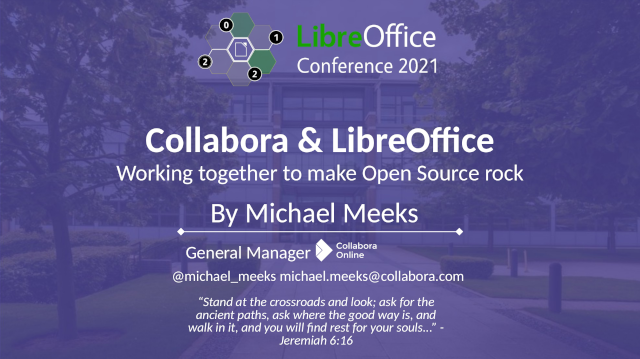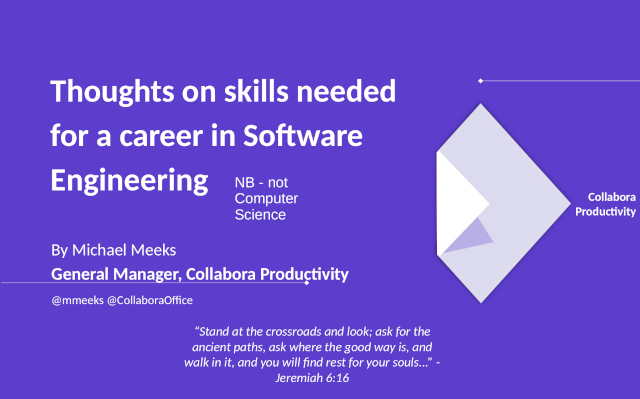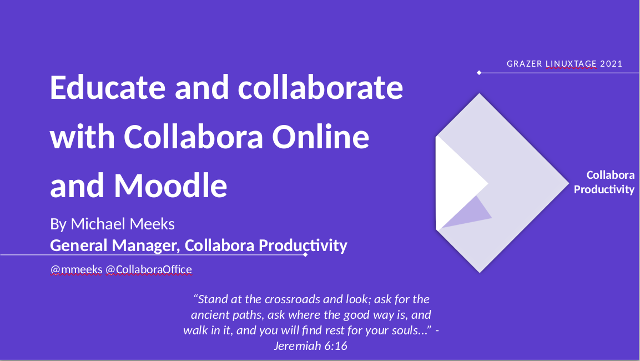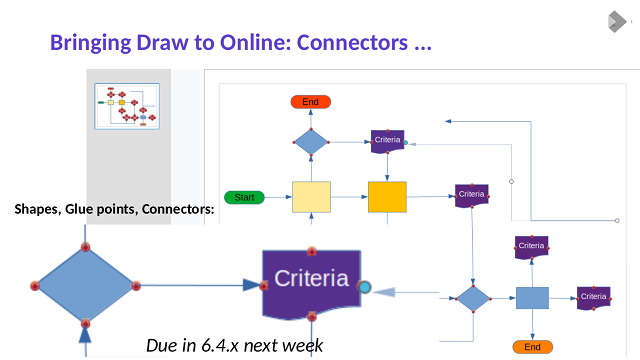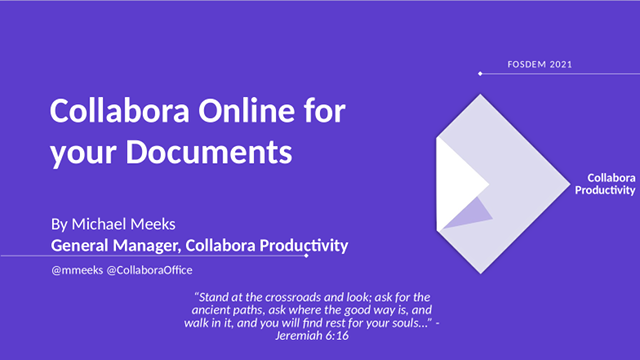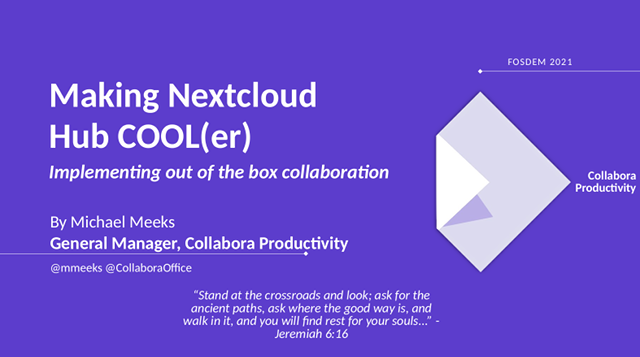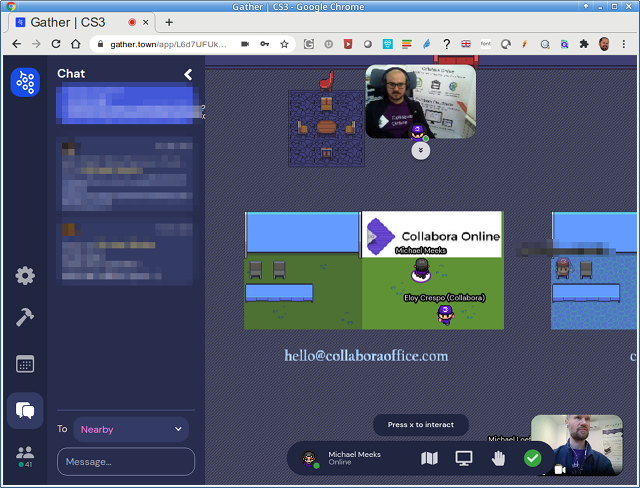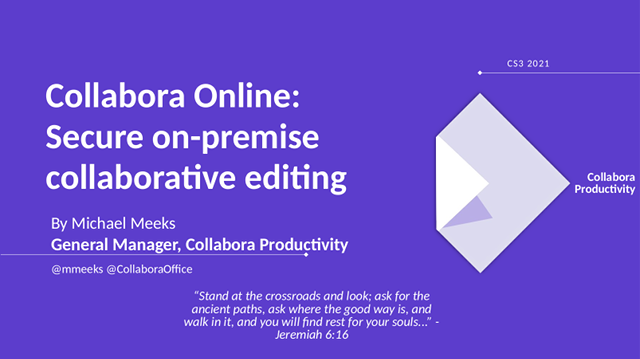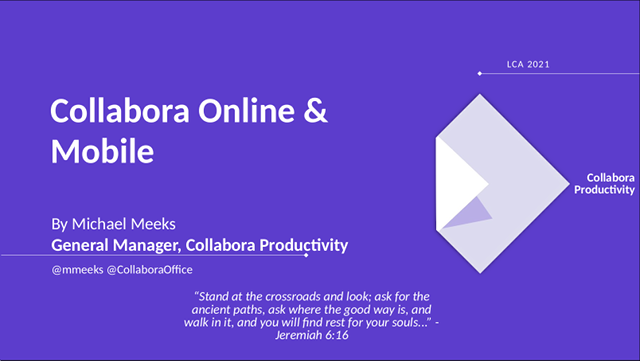Young & foolish?
In 1988 as a scrawny eleven-year old arrival alone at boarding
school, perhaps the only Quaker in a thousand strong body; I wore
a white poppy
to the large Remembrance
Day commemorations. I recall the
interest and forceful objections of my peers and elders - some
with armed service connections, and my impassioned pleas for
a personal pacifism. No doubt there were some who were
intellectual defenders of the doctrine of Just War: (love's
response to a neighbour threatened), as I myself became later
in life - but I suspect that the fun of picking on those who are
noticeably different was the dominant motivation. I imagine a
majority of those in the Free Software community have suffered
similar or more traumatic experiences, associated with being
noticeably and vocally different; of being outstanding in one
area & yet weak in others: perhaps socially and/or athletically.
Hopefully that lets us empathise with others who are oppressed.
That's why in this debate I think the purest motives on both
sides here are closest to this: What is love's response to a
neighbour who is threatened? and then what is
proportional?
Disclaimer: something must be done
Recently RMS returned to the FSF board with to my mind an indefensible
lack of grace & engagement with his critics. This seems to
unfortunately intersect with the absence of good, representative
governance structures for eg. GPL users to affect license direction.
People started on-line petitions in liu of voting to either remove the FSF board
or to unconditionally support RMS.
Spoiler alert - there is something to annoy everyone here.
I don't believe either of these stated positions is helpful and one of
them is actively dangerous. I expect RMS to demonstrate hard-core
leadership by preparing for his inevitable political or physical death,
and building good governance structures that can live on and
continue his work. It is not a time to do nothing.
KDE's,
statement seemed constructive,
Debian
had a middle ground option, and even
RedHat's
position was not so extreme. I sincerely hope that the FSF can be
improved and continue to reflect RMS' vision of Software Freedom.
Its not all awful
The open letter to remove the FSF board contains
much that is deeply problematic, yet there are some sensible pieces,
take this one:
While these ideas have been popularized in some form by Richard
M. Stallman, he does not speak for us. We do not condone his actions
and opinions. We do not acknowledge his leadership or the leadership
of the Free Software Foundation as it stands today.
Notice the credit, and yet creating distance, notice the sensible tone,
and the moderate approach. I would like to think that the several
thousand people signing up to this, many of whom I like, some of whom
I've really enjoyed working with are primarily saying only what this
paragraph says. If so - good, I can understand that.
Unfortunately alongside this reasonableness are some very profound
problems that needlessly makes this one of the most divisive
initiatives I've seen in free-software:
Attacking people's beliefs?
The rational here seems really damaging:
"He has shown himself to be misogynist, ableist, and transphobic,
among other serious accusations of impropriety [impiety?]. These sorts of
beliefs have no place in the free software, digital rights, and
tech communities. ... There has been enough tolerance of RMS’s repugnant
ideas ... we will not continue suffering his behaviour, ... or
otherwise holding him and his hurtful and dangerous ideology as
acceptable. ... We ask for contributors to free software projects to
take a stand against bigotry and hate within their projects."
This focus on beliefs is unconscionable. Beliefs struggle to exist
outside people's heads so I read this as:
People who we can plausibly accuse of having misogynistic, ableist or
transphobic beliefs have no place in the free software community.
This might sound plural and welcoming, and I understand the desire to
stick up for those who are marginalized, but it has a number of acute
problems.
What is the new orthodoxy?
Which are the views that must be held (or not held) to have a
place in free software? Unfortunately the new orthodoxy while having
sixteen promoters is unbounded - we are not given a comprehensive creed.
We do have some very precise examples on what is not acceptable though.
Lets take trans-phobia. Apparently RMS while not on the autistic
spectrum, does have a phobia.
However - exactly what that phobia is is rather less than clear. Many
(including I suspect RMS) are convinced that he is not
transphobic. There seems to be a somewhat complex difference in
the doctrine of how best to
de-gender
pronouns which causes the problem.
Interestingly the ableist issue when I skimmed the snippets
seems to be rooted in a specific view on the ethics of abortion. As
a young woman finds herself unexpectedly alone at a crossroads of
life-changing consequence it is hard not to have deep compassion
for her! Indeed, my wife has spent some years giving space and a
listening ear, to help women think through their choices at this
crisis point.
Views vary widely here, but it seems that even among
abortion activists the (perhaps comforting) view that there is
zero moral dimension: that the act is no more significant than
clipping your fingernails is a rather extreme one. Nevertheless
if you hold it I expect it makes it much harder to critique selective
abortion - whether for sex, disability or (as technology advances)
more eugenic Gattaca-style scenarios.
I read RMS' deeply disturbing advice on selecting for ability
(which is sadly common) as flowing from this understanding.
Should an affirmation of the wonderful, unique, created in the
image of God value of all persons at some point in this process
be mandatory for inclusion in our community? A tough one.
Apparently the signatories of this document also think that
having mysogynistic beliefs is grounds for excommunication from
the free software community. Who chose these three beliefs? where
did they appear from? are there any more things
we should not believe? Presumably traditional convictions around
marriage are also grounds, cf. the Brendan Eich hysteria but; what
else?
On excommunicating heretics
The paradox of
intolerance is often aired to lazily avoid spending any thought
justifying this sort of statement & action. One day I hope to have time
to read The
Open Society and its Enemies and its counterpoint. The vital
need is to respect the dignity, protect the property, and cherish the lives
of others - particularly those who have historically suffered. I can
see how this is especially important to trans people, and I take no
pleasure in seeing them offended. Having said that there are
also many groups who have suffered historically in horrible ways.
History is indeed littered with examples of well meaning intolerance
going badly wrong. It is also clearly the case that some speech is
unacceptable (but beliefs!?). The interesting question here is
really where to draw the line.
No doubt it feels good to stand up for a vulnerable
marginalized community by excluding those with whom they
disagree. I do wonder whether that is easier than trying to
understand and accurately portray both sides - or "putting
the work in to understand other human beings".
This is fun! lets find more heretics!
It seems to me there is a substantial convergence of views
between RMS and this new orthodoxy - so it should be far easier to
find those whose beliefs diverge significantly. Luckily very
detailed descriptions exist of what very large groups of people believe
around the world. Many have different ideas of how best to
love those with whom they disagree. For example Male
and Female he created them - towards a path of dialogue on the
question of gender theory in education. (published 2019 under
Pope Francis). That should be easy to caricature in order to exclude
people from the Free Software community. I think it would also be easy
to argue that a loyal Catholic faithfully upholding the Churches'
teaching has beliefs that are more easy to caricature as mysogynist
than RMS'. I really don't want to pick on Catholics (who just happen to be
rather good at multi-lingual write-ups of their doctrines), so how
about a random update from the Church
of England. Of course - in each case adherents would reject such a
caricature and these labels; no doubt they would also have
powerful convictions on when life begins. But perhaps that's all a
bit Euro-centric -
so how about Wikipedia on Islam,
or we can spend all day cycling through major belief systems each
representing hundreds of millions of people, and collectively
billions. Almost all of these will have some element that will conflict
with or upset the opinions of someone else. Most of these belief
systems are mutually contradictory and/or mutually offensive at some
level to adherents of others. So there should be no shortage of
beliefs for which we can excommunicate others.
I hear the common objection: "But I have a friend who is a <insert
religion> and they don't believe anything (like that) - perhaps we
can only exclude the ones that actually believe these things?". I'm
sure you do have such a friend, and so do I. Clearly no world religion
has a monolithic interpretation. The balance between revelation &
personal experience, the hermeneutics and theology varies extraordinarily
widely. That results in sets of people under the same apparent umbrella
holding widely different beliefs; even if we can safely assume that you truly
know what your friend believes; and this is before we get into more esoteric
Spaghetti Monster style creeds.
All that aside - I see no way to argue for excluding RMS on the basis of
his beliefs (ie. he is not progressive-orthodox enough) without also
loosing a big chunk of the rest of the world as well. Please notice -
nothing in the statement that so many signed says this is specific to
leaders, or being a prominent person, each belief itself is grounds:
"these sort of beliefs have no place in the free software community?".
Why pick belief as a rationale?
Potential allies in surprising places
An acquaintance of a friend spent many decades smuggling
'pornographic
literature' into the Eastern Block - (very good for
marriage enrichment). He also founded a non-profit
Open Doors, here's a quote from the pre-amble to their
watch list:
In the most populated countries on earth, [people] live in a surveillance
state ... China has also developed widespread facial recognition software
and established laws requiring facial scans to purchase a phone. When
taken together, these two technological advances mean the government
can track individuals like never before ... China is also rolling out a
country-wide Social Credit System (SCS) by which authorities plan to
reward "good" citizenship and punish "bad."
Do people with those beliefs, who are actively working to educate,
lobby, change hearts & minds to guard society and help others -
have common cause with us in the
"digital rights community"? -
or do they need excommunicating too?
It is interesting that Open Doors provide one of the more conservative
estimates of the ~thousand(s) of Christians killed each year specifically
for their faith. I worry about an ethnocentricity that extrapolates from
the USA's poisonous cultural divisions to erase the oppression of
minorities around the globe. It is not acceptable to consider the impact
of community policies based only on the Silicon Valley population &
culture.
Transient heretics in surprising places
Another interesting problem with orthodoxy is the surprising
belligerence and infighting that it can breed - often on minor
issues. This is familiar from the innumerable schisms in small
churches. A joke is told in the aftermath of a church dividing;
of an old friend checking in with one of the new leaders:
"Ah, these
are terrible faithless times - we've split again over doctrine,
and now it's just me and my brother. And to be honest - I'm not
so sure about him!".
I was interested to see the story of eg.
Valerie Aurora:
an extremely smart & dynamic feminist who is a leading
expert on the latest diversity topics. Yet she was somehow
ejected
from
Double Union the hacker/maker space she co-founded
because of inadvertently
infringing
the code of conduct that she ~wrote. I fear living in a world where
even outwardly conforming to the latest progressive orthodoxy
would tax the wisdom of Solomon.
Prophets of a new creed
It is interesting to read about the beliefs of some of the people
involved here; sadly I don't know Molly - but I've had the privilege
of working with Matthew Garrett in his early days on GNOME - and a
smarter, more charismatic, outspoken, iconoclastic(?), amusing
person it's hard to find - quite apart from his amazing depth of
contribution to Free Software. I was interested to try to quickly
skim Molly & Matthew's beliefs based on what they write and
see how they measure up.
Before doing that - let me re-assert that I take the freedoms of
speech, conscience and expression extremely seriously as
self-evidently vital for the functioning of an open society,
though not
absolute.
While I want everybody to live in a physically safe space, I
want to discuss views robustly in an atmosphere of respectful
enquiry, with complete freedom and openness. It is not my
intention to enlarge the sphere of (self) censorship.
There is however a kind of humour whose value (if any) is drawn from
trampling the personal & sacred to elicit a response;
is it nervous schadenfreude for those thus offended? (in this case
those who love Christ more than friends or family).
I don't see many cursing with ~obsolete god's names eg.
Marduk so
what can we learn from:
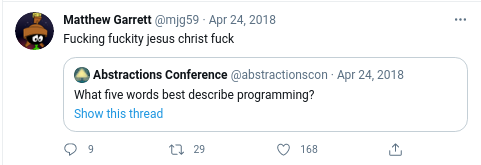
I'd prefer five words such as: challenging, fascinating,
absorbing, collaborative, rewarding myself - but I'd hate
to live in a world devoid of humour. Another example - I was
interested by Molly's re-tweet on another hot potato (as always well
worth reading the
primary
source court judgement rather than the dubious spin below):
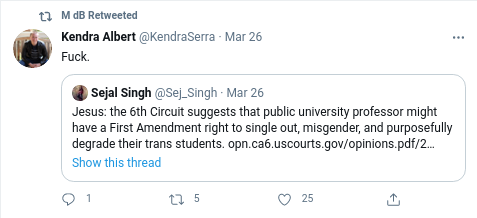
To me it is curious that someone can champion excluding people
over their heterodox beliefs, while simultaneously shouting
things like the below; perhaps some irony overload here:
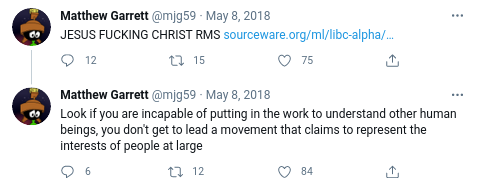
Apparently it is easy to end up championing the gentle
treatment of a sexual minority while thinking it is funny to be
gratuitously offensive to other minorities. Surely it can be offensive
enough to respectfully state ones position. Still - in a world where
there is a broad freedom of belief, conscience and speech, possibly
some humour can cut through the gloom.
A possibly tragic, possibly humorous but probably co-incidental aside
here is that some chunk of this is based on an excessive focus on a
small divergence in linguistic orthodoxy; when this was a hallmark of
the GNU-slash-Linux campaigns of the past.
Perhaps you think it is deeply unfair to examine people's
public twitter feeds - which occur outside the context of a
project - to determine whether their beliefs are aligned
with the standards they demand from others. Actually - I tend to
agree. For good reason any sensible code of conduct excludes
speech and behaviour outside its immediate project context. Not
so this statement - its scope is everyone, everywhere and all
of the time - even historic beliefs.
But possibly you think that it is ok to attack the privileged to
defend the weak; that it is proportional to agitate to end
someone's career in order to avoid the risk of a friendly
minority member inadvertently working alongside someone who
has some subset of beliefs that differ from theirs.
Saint Obama: the world is complicated
I was encouraged recently to watch
this, and I excerpt the first part:
This idea of purity, never compromised, always politically woke
& all that stuff - you should get over that quickly. The world is messy,
there are ambiguities, people who do really good stuff have flaws.
(his Catholic vice-president also seems to be doing well
as of late too). I expect that any model of people that doesn't
tolerate the complexity and malleability of human experience
and belief will ultimately not represent the world well.
That will lead to disappointment. You should get over that
quickly. I'm certainly far from perfect, my views change over
time, perhaps the same is true for you.
As Lincoln pointed out that Those who look
for the bad in people will surely find it, I'm often
guilty of that myself.
Conclusion
Should we fear a world-view that locates most of the world's problems
in other people? The flaws I'm most concerned
about are my own (which are more than obvious though I'm
certain
I have more that you can locate). It is because of those flaws
that I need to live in a place that is patient and loving.
Should we fear a world-view that builds a path to redemption via
being maximally unpleasant to others who disagree? Or is it
better to try hard to "Act justly and to love mercy and to walk humbly
with your God" (Micah 6).
Is being offended occasionally by others' (truly objectionable)
beliefs the price of collaborating with people with diverse viewpoints,
discussing anything and everything without boundaries and learning?
Not always a small price to pay, but is it not necessary?
Surely it is the case that each member of outlying groups
benefits from mutual tolerance. Indeed we
often celebrate the amazing contributions to society of those
who (at the time) were viewed to have unacceptably fringe
beliefs & practices. Becoming a less tolerant society
is potentially polarizing and dangerous.
What is love's response to a neighbour in need in
this instance? Probably it is to vigorously encourage RMS to
setup a representative governance so actual users of the GPL
family can determine its post-RMS future. Perhaps it is to
loudly re-iterate the obvious: that RMS does not represent you
or me - and that we don't share the details of his unusual
politics; to make more obvious that personal views are
disjoint from organizations' missions, and to ensure we are
able to choose our representatives in a secret ballot.
But love's response is certainly not to let Free
Software get twisted into a new and narrow orthodoxy consumed
by gender politics to its own harm and the exclusion of others.
We should remain a broad, tolerant and inclusive church even
when it hurts.
We used to be focused on liberty & freedom - I miss that.
"We ask for contributors to free software projects to
take a stand against bigotry and hate within their projects."
Bigotry -
a stubborn and complete intolerance of any creed, belief, or opinion that differs
from one's own.
Postscript A - why religious tolerance?
It seems obvious to me that this new orthodoxy combined with
political power is rather dangerous. Perhaps those who have not
grown up with some of the common stories would do well to read
them. How about the
fiery
furnace - takes two minutes of your life; but why is it
so hard to show due respect to the pagan government's request?
is that really breaking the 2nd commandment? Or - if you have
a very strong stomach - try just
eat the pork: why won't they obey orders from an
authority
(Epiphanes: 'god manifest') - perhaps interesting? What requirements
or forced conformity might be too much?
Is there a shortcut via coercion to truly change society to
how I want it to look? or is winsome persuasion the best way?
Of course there is a shameful
record of burnings, division & bigotry - often over rather
small divergences in orthodoxy throughout the Church's history,
without even getting into where major creeds interacted at a
larger world scale. Then again I'm sympathetic to the
Pastafarian concern that arbitrarily unreasonable creeds can
be created, and that other points of view have no systematic
orthodoxy to protect them which seems unfair: surely it is so: so
lets treat all people fairly when our worlds collide.
Postscript B - hiring people
"We want to hire diverse people - but only if
they are exactly like us."
One of the things that has saddened me most among those I've
worked with in the past is that it is now acceptable for people to
say that they would not hire people with beliefs that I know many
wonderful, excellent, Christian programmers have. There is a
rising tide of intolerance of those that are perceived not to
kowtow to the new progressive orthodoxy.
Generally an attitude of graciously accepting others' hostility
has held, along with avoiding law-suits. I fear though
that as attacks on believers' presence in Free Software get more
explicit there will be a slowly growing realization of the problem here.
Not to pick on Mozilla (though they did sign this problematic statement) but
I'm curious how views
that are 'traumatic and damaging' can be accommodated there. I think
it is past time to start monitoring religious affiliation as well as
ethnicity as part of
diversity.
Can any company explain how These sorts of beliefs have no
place in the free software, digital rights, and tech communities
can intersect with companies that build products around such communities?
Surely we can find lots of quotes saying how important community is to
developing software. Surely we can find statements that employees are
members of such communities. So is it really credible to a-priori exclude
masses of people on the basis of their beliefs from your employee pool?
Does that extend to refusing to hire people based on their beliefs? Or
perhaps people with incompatible beliefs just get inferior jobs inside
the company partitioned away from those communities? Certainly - I feel
far from safe & welcome applying to one of the listed companies
there without further re-assurance. It is deeply ironic that in
the past one of the (baseless) explanations from some of the more
reasonable people I talk with for excluding believers from management
is that they might discriminate when hiring.
If this statement was focused on leaders, it could be characterized
as installing a new glass-ceiling for any who are not progressive-orthodox.
Even if it were re-written as a criteria for leaders - I'm still far
from sure we will get better leaders by selecting for conformity
rather than competence.
As the virtual becomes increasingly
more important than the physical for some people's livelihoods
hopefully we can all agree that encouraging equitable behaviour
online is a good thing.
Postscript C - (goes without saying)
As should not need saying: these views are mine, my own. I don't
speak for my employer, nor any projects I'm affiliated with, nor
my Church, or my friends. Feel free to borrow any views you find
persuasive or reject any you find objectionable.
Updates
2021-04-14: Impressed to receive a very gracious apology from
Matthew G for his language; though of course - I'd prefer movement on
the substance; good chap; (he approved this, and tweeted).
Also an amusing comment from a friend on the parallels between Act
justly, and to love mercy and the Robustness
principle
In case it's not painfully obvious: the reflections reflected here are my
own; mine, all mine ! and don't reflect the views of Collabora, SUSE,
Novell, The Document Foundation, Spaghetti Hurlers (International),
or anyone else.
It's also important to realise that I'm not in on the Swedish Conspiracy.
Occasionally people ask for formal photos for conferences
or fun.
